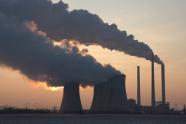Sierra Club Report Challenges Coal Theories

The Sierra Club on June 28 released a new,
28-page study claiming that the days of cheap
coal-fired power are now over, both in the U.S. and
around the world.
The report, "Locked In: The Financial Risks of New
Coal-Fired Power Plants in Today’s Volatile
International Coal Market," challenges the
traditional view that coal is a cheap and reliable
energy option for countries around the world. At a
time when coal-fired power is at a historic low in
the U.S. and the European Union, the report warns of
developing countries locking themselves into coal
plant investments that face significant financial
risk from rising costs.
The report, authored by Bruce Buckheit, former
Director of the U.S. Environmental Protection
Agency’s Air Enforcement Office, highlights the
rising costs of coal plant construction, rising
global coal prices, and the emergence of what it
called an “Organization of Coal Exporting Countries”
-- all of which make electricity from coal-fired
power plants inherently risky and unaffordable for
countries around the world. There is no such
organization, by the way. The report calls this an
organization “acting in effect, if not in name.”
“Environmental and public health concerns aside, the
truth is coal is just a lousy financial investment,”
said Justin Guay, Washington representative for the
Sierra Club. “Policymakers and financial
institutions need to catch up to this 21st century
reality - coal is no longer affordable.”
Construction cost overruns of up to 100% have become
common-place while coal prices continue to rise
around the world, the report said. Those costs are
exacerbated by an “emerging OCEC that dominates a
highly concentrated global coal market,” said the
Sierra Club. “The top two producers alone --
Australia and Indonesia -- account for more than 50%
of global coal exports, providing ample opportunity
for maintaining high coal prices. Often
prevented from passing on these costs to consumers
due to domestic regulatory structures, coal plant
investments in China and India retain maximum
exposure to these cost fluctuations which puts
significant pressure on profit margins, making them
extremely risky investments.”
The fallout from these rising costs is already being
seen, the report claimed. In India, the 4 GW Tata
Mundra Ultra-Mega Power Plant project is seeking to
be released from its long-term power purchase
agreements in the face of billions of dollars in
losses, before it has completed construction, it
said. In the U.S., the recently-completed Spiritwood
Station coal plant in North Dakota has opted to
remain idle rather than operate at a loss, the
report added.
Sierra Club points to scrapped coal plant projects
in U.S.
“In the United States, plans for 168 new coal-fired
power plants have been abandoned and another 100
existing plants are planned for retirement due in
large part to increased financial and environmental
costs along with intense grassroots opposition,”
said the Sierra Club report. “As a result,
coal-fired generation has fallen to its lowest share
of overall generation in the past 35 years.
"The contribution of coal-fired generation in the U.
S. dropped to 34 percent in March 2012, marking the
lowest monthly share since January 1973. In Europe,
coal’s share of generation has declined from 39.4
percent to 25.7 percent over the past 20 years. Of
the 120 coal-fired power plants proposed in Europe
since 2007, only half a dozen have broken ground and
the overall share of coal in the fuel mix is
declining rapidly. In 2011, 71 percent of the new
electricity capacity in the European Union was
renewable energy, while 22 percent was natural
gas-fired generation.”
Leading competitors such as wind energy and solar
photovoltaic (PV) panels are experiencing plummeting
prices and rapidly becoming competitive with coal
fired power, the report said. It documents that the
cost of power from solar PV has fallen by over 60%
since 2008, while new wind power can provide energy
at 5-10 cents/kWh, making it competitive with coal
in any market.
“Clean energy is increasingly competitive around the
world,” said Guay. “Countries and financial
institutions that lock themselves into coal
investments are exposed to the risk volatile
international fuel markets – something clean energy
investments avoid.”
Sierra Club argues against coal in increasingly
coal-reliant countries
Notable is that most of the coal development, and
there is a lot of it despite the Sierra Club's
contention, is in the developing world, including
India and China. The report tries to argue against
such projects, due in part to alleged price and
supply risk for coal moving into those plants from
offshore suppliers.
"This poses tremendous risk for a number of Asian
countries that have undertaken construction of large
numbers of new coastal coal plants that would rely
to a significant extent on imported coal supplies,"
said the report.
Cassell is chief analyst coal for Generation Hub, where this article first appeared. GenHub is a unit of Energy Central
Copyright © 1996-2012 by CyberTech, Inc. All rights reserved.
To subscribe or visit go to: http://www.energycentral.com
To subscribe or visit go to: http://www.energybiz.com